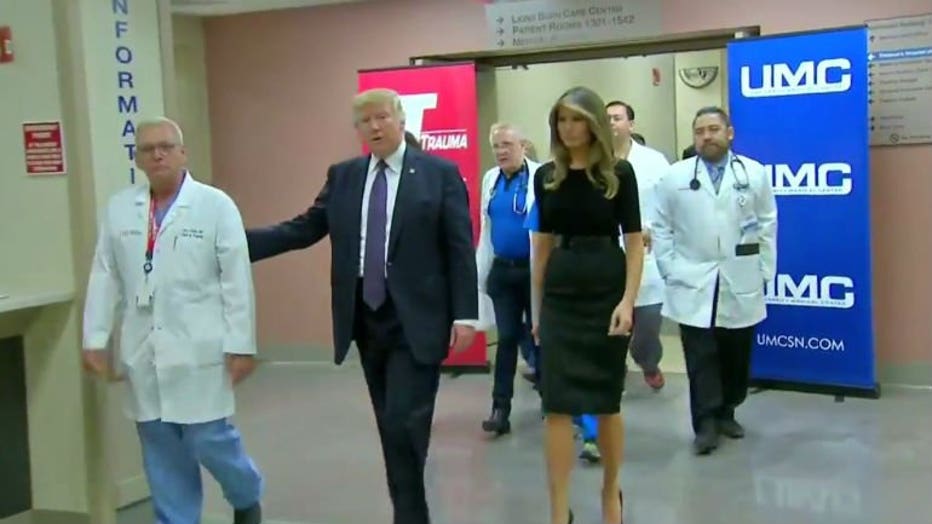President Trump lauds Las Vegas victims, doctors, police: "Amazing people"
LAS VEGAS — President Donald Trump and first lady Melania Trump met privately with victims of the Las Vegas shooting at a hospital Wednesday, praising them and the doctors who treated them as he visited a city still reeling from the worst gun massacre in modern U.S. history.
He also met with first responders who'd been on duty Sunday night, telling them: "You showed the world and the world is watching, and you showed what professionalism is all about."
Air Force One landed at the airport near the famed Las Vegas strip on a bright, sunny morning just days after a gunman on the 32nd floor of a hotel and casino opened fire on people at an outdoor country music festival below. The Sunday night rampage killed at least 59 people and injured 527, some from gunfire and some from a chaotic escape.
President Trump's first stop was the University Medical Center, where he spent 90 minutes meeting privately with victims, their families, and medical professionals.

President Donald Trump, First Lady visit UMC in Las Vegas.
Speaking to reporters from the lobby of the University Medical Center lobby, President Trump said he'd met "some of the most amazing people" — and had extended some invitations to visit him in Washington.
He also commended the doctors who'd worked to save them for doing an "indescribable" job.
"It makes you very proud to be an American when you see the job that they've done," he said.
President Trump then headed to the Las Vegas Metropolitan Police headquarters, where he met with police officers, dispatchers, and others who'd responded to the shooting.
On his trip from the airport, the president's motorcade drove past the Mandalay Bay hotel where the gunman fired down into the concert crowd.
Throughout the visit, President Trump focused his remarks more on praising recovery efforts -- commending doctors and first responders -- than on grieving the dead.
"It's a very sad thing. We are going to pay our respects and to see the police who have done really a fantastic job in a very short time," President Trump told reporters before departing the White House. "It's a very, very sad day for me personally."
On his trip from the airport, the president's motorcade drove past the Mandalay Bay hotel where the gunman fired down into the concert crowd.
The president also drove past his own Trump hotel.
President Trump's trip to Las Vegas follows his Tuesday travel to hurricane-ravaged Puerto Rico — a pair of back-to-back episodes that are testing his ability to unite and lift the nation in times of strife. President Trump, a leader who excels at political provocation and prides himself on commanding strength, has sometimes struggled to project empathy.
During Tuesday's trip, he highlighted Puerto Rico's relatively low death toll compared with "a real catastrophe like Katrina," when as many as 1,800 people died in 2005 as levees protecting New Orleans broke. He also pointed repeatedly to praise his administration had received for its efforts, despite criticism on the island of a sluggish response.
President Trump has a long personal connection to Las Vegas — a city where his name is written in huge golden letters atop his hotel. He also campaigned extensively across Nevada during his presidential campaign, drawing large crowds to rallies along the Las Vegas strip.
President Trump told reporters Tuesday night that his trip would include spending time with "some of the folks that are recovering, some of the survivors," and seemed emotional as he spoke about the human toll.
"We're going to be seeing - ah it's a very, it's very, it's a very - horrible thing, even to think about. Really horrible," he said. "We're also meeting with the police, the sheriff, and we're going to spend quite a lot of time in Las Vegas."
President Trump was also joined on the trip by House Majority Leader Kevin McCarthy and Nevada Republicans Rep. Mark Amodei and Sen. Dean Heller.
President Trump offered somber remarks about the shooting from the White House on Monday, saying "our unity cannot be shattered by evil, our bonds cannot be broken by violence."
Republicans who control Congress have made clear they have no intention of taking up gun control measures, such as tightening restrictions on semi-automatic weapons and high-capacity magazines, in the shooting's aftermath.
President Trump, in a 2000 book, said that he supported a prohibition on assault weapons and a "slightly longer waiting period to purchase a gun." He also said in 2013 that he supported "background checks to weed out the sickos."
But President Trump ran his campaign with a strong pro-Second Amendment message and the backing of the National Rifle Association.
"Gun and magazine bans are a total failure," read one campaign policy paper. "Opponents of gun rights try to come up with scary sounding phrases like 'assault weapons,' 'military-style weapons' and 'high capacity magazines' to confuse people. What they're really talking about are popular semi-automatic rifles and standard magazines that are owned by tens of millions of Americans."
On Tuesday, President Trump appeared somewhat open to having a debate on guns, but not anytime soon.
"At some point, perhaps, that will come," he told reporters. "But that's not for now."

